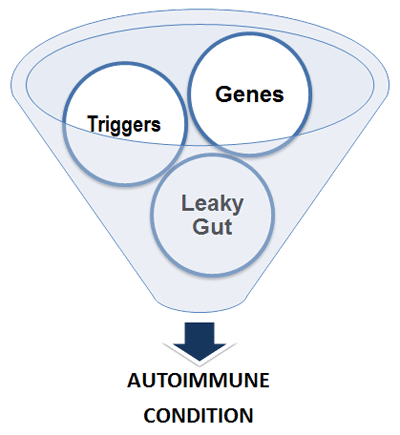According to the U.S. Department of Health and Human Services, 23.5 million Americans are affected by one or more autoimmune diseases. These are conditions for which the body’s immune system mistakenly considers its own organs or tissues foreign invaders and attacks them. Of the 80+ known conditions, familiar variants include celiac disease, diabetes type 1, Grave’s disease, Hashimoto’s thyroiditis, multiple sclerosis, psoriasis, rheumatoid arthritis, and lupus.
So how does someone wind up with an autoimmune condition?
 The latest research suggests that these diseases manifest as a result of a “perfect storm” of the following three elements:
The latest research suggests that these diseases manifest as a result of a “perfect storm” of the following three elements:
- A genetic predisposition for the condition
- One or more “triggers” for which the affected individual is sensitive – e.g., food allergies, chronic inflammation, nutrient depletions, infections, toxins
- A “leaky gut” that allows bacteria and dietary antigens (i.e., molecules capable of producing an immune response) into the bloodstream.
To date, there is no permanent cure for an autoimmune condition. However, through lifestyle and dietary changes, the “triggers” can be eliminated, and the “leaky gut” repaired. With no trigger(s) and “leaky gut,” the autoimmune condition can go into remission.
Different people have different triggers for their conditions. It can take time to figure out the root cause of an autoimmune response. Food allergies are common irritants, with milk, eggs, peanuts, tree nuts, fish, shellfish, soy, and wheat accounting for 90% of all sensitivities. Chronic inflammation is another common trigger. It occurs when the immune system is constantly fighting allergies, infection, and/or toxins. When the immune system gets stressed, it can “go rogue” and start attacking the body’s own tissues. These triggers must be eliminated to eradicate inflammation and allow the immune system to become calm, strong, and responsive.
Intestinal health is paramount for persons affected by autoimmune disease… and everyone else, for that matter. The intestines break down the food we eat to extract nutrients that fuel our bodies. They keep our water and electrolytes in balance. They also play a big role in the proper functioning of our immune system. Three conditions impair gut function:
- “Leaky Gut”: When healthy, the small intestines maintain tight junctions in the endothelial lining that block all but the smallest of food particles from passing through the intestinal wall. When these junctions become loose, forbidden substances make their way out of the gut. Common factors that increase intestinal permeability include: alcohol, food allergies, gluten, NSAIDs (e.g., Advil, Motrin, ibuprofen), psychological stress, surgery/trauma, and unsaturated fats.
- Imbalanced Bacteria: The gut needs a strong population of friendly bacteria to help break down food. Antibiotics kill off good bacteria along with the bad, leaving undigested food in its wake. That residue provides the breeding ground for unhealthy bacteria. The resulting small intestine bacterial overgrowth (SIBO) can cause or exacerbate “leaky gut.” Excess estrogen and undigested seeds also precipitate SIBO.
- Compromised Nutrient Absorption: The gut uses hair-like projections called microvilli to extract nutrients from our food. Foods high in lectin – e.g., grains, legumes, and nightshade vegetables – may interact badly with the brush border, causing it to flatten. With reduced surface area for food interaction, fewer nutrients get absorbed. (Note: Proper food preparation can eliminate lectins from foods.)
In The Autoimmune Solution, Dr. Amy Myers, MD provides a four-step process to remove the autoimmune triggers, restore digestive enzymes, re-inoculate healthy bacteria, and repair the gut. The following dietary precepts form the foundation for her protocol:
- Work with a physician (preferably one trained in functional, integrative, or naturopathic medicine) to diagnose the condition(s), render lifestyle and dietary recommendations, prescribe medication and supplements (as needed), and monitor progress.
- Eliminate all sources of gluten (including food and personal care products) and all forms of processed carbohydrates, sugar, and starch.
- Eliminate soy, grains, legumes, and nightshade vegetables (e.g., potatoes, tomatoes, eggplant, peppers).
- Eliminate Genetically Modified Organisms (GMOs) from the diet. They’re bred to resist pests, diseases, pesticides, and herbicides; they may resist our digestive processes, too.
- Use grass-fed beef/pork, free-range poultry, and wild-caught fish as sources of protein. When eating non-organic meat or farm-raised fish, we’re feasting on the GMO-based grains that they were fed.
- Buy organic produce to maximize the nutrient content of the food. Organic produce benefits from the farmer’s attentive care of the soil and natural remedies for pests and disease.
- Get rid of Teflon cooking surfaces; avoid plastic for food preparation or storage.
- Consider installing air and water filters for the home.
Autoimmune disease prevents challenges for those afflicted, but there is a message of hope. By getting rid of the “triggers” and healing the gut, the antibodies that are destroying healthy tissue can go away, and the body can repair the affected areas.
Resources:
- The Paleo Approach: Reverse Autoimmune Disease and Heal Your Body, by Sarah Ballantyne, PhD
- THE AUTOIMMUNE SOLUTION: Prevent and Reverse the Full Spectrum of Inflammatory Symptoms and Diseases, by Dr. Amy Myers, MD
- HASHIMOTO’S THYROIDITIS: Lifestyle Interventions for Finding and Treating the Root Cause, by Dr. Izabella Wentz, PharmD, PASCP
- HASHIMOTO’S PROTOCOL: A 90-Day Plan for Reversing Thyroid Symptoms and Getting Your Life Back, by Dr. Izabella Wentz, PharmD, PASCP